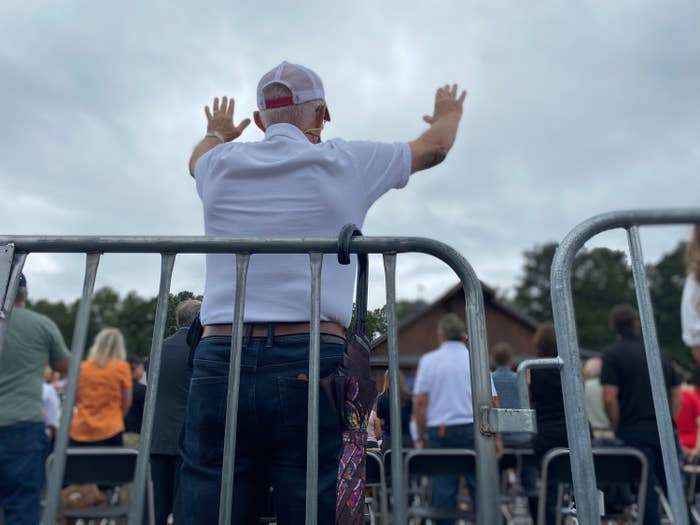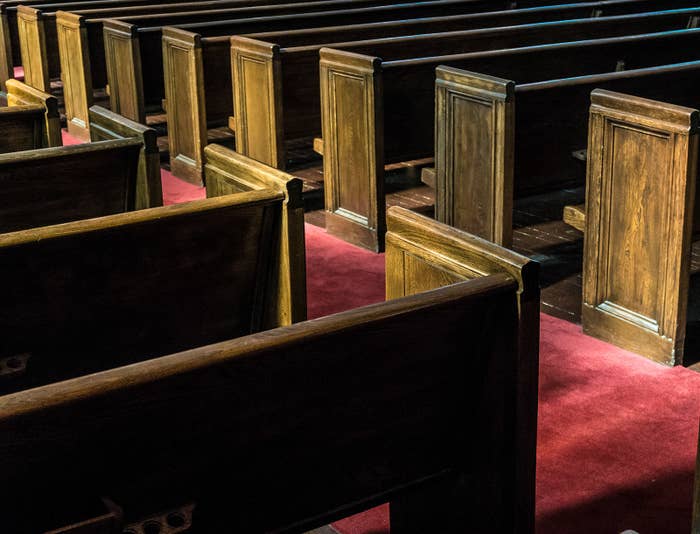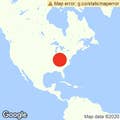
MCDONOUGH, Georgia — When Paula White, President Donald Trump's spiritual adviser, said last year that Christians who vote against the president “would stand accountable before God,” one Black pastor shot back on Instagram.
“Looks like the FALSE PROPHET @paulamichellewhite is back at her dirty tricks to deceive the naive and uninformed,” Pastor Mike McBride wrote.
White reached out to McBride trying to refute him and scold him for not reaching out to her first — a message that opened, “Hello sir!”
To McBride, White’s comments were “blasphemous” and he told her so during a direct message exchange on Instagram. Their Instagram exchange, screenshots of which were reviewed by BuzzFeed News, resulted in an hourlong conversation between the two religious leaders, according to McBride.
White, a televangelist from Florida who also chairs Trump’s Faith and Opportunity Initiative, phoned McBride from an unlisted number last year to, as McBride puts it, “tell me all the good that the president has done.”
Before the call ended, McBride told BuzzFeed News he gave White one last piece of advice: “You should talk to more Black people because there’s nothing worse than a white person telling Black people what somebody has done for us.”
In Georgia, where White recently rallied Trump supporters ahead of the presidential election, the divide between the white and Black church is increasingly bitter and transparent. Part of it is just Trump, who has polarized religious communities along racial lines, and who faces a real risk of losing Georgia in November. But the divide has become even more explicit in the day-to-day during the coronavirus pandemic, which has killed more than 200,000 Americans and resulted in the hospitalization of the president himself.
“If you’re a white church, you’re open. If you’re a Black church, you’re not,” said John Onwuchekwa of the Cornerstone Church ATL.
Onwuchekwa publicly left the Southern Baptist Convention this summer because he felt the organization was slow-walking racial justice reform. And since the spring, his church has been online only. “The day that the NBA said 'we're done,' that next day, in-person services ceased," he told BuzzFeed News. “For us, it was just like...for one, we just don't know what this is."
It’s a common difference between the churches in Georgia right now that are grappling with the coronavirus. More than 7,000 people have died from COVID-19 in the state, and those numbers have deterred many of the most vulnerable — churches with large Black congregations — from returning to in-person activity.
Gov. Brian Kemp reopened the state on April 24; a month later, Trump declared places of worship essential, settling a nationwide dispute as to what category they fell under during the pandemic. By then, and soon after, many evangelical churches led by white ministers with predominantly white congregations in Georgia were opening their doors. Many Black churches, some of which had been closed since March 15, continued digital services and one-on-one Zoom meetings with members of their congregation.
“I would be overwhelmingly reckless and irresponsible to put 6,500 people in my sanctuary while COVID numbers in Georgia are still escalating,” Pastor Jamal Bryant told BuzzFeed News, adding that the divide on masks wearing is that of a political nature and has nothing to do with theology.
State data shows the statistics mirror other parts of the country: Older adults and Black people have disproportionately died of the coronavirus. Data in June showed that 79% of people hospitalized in Atlanta for COVID-19 were Black.
There are some outliers among Black churches led by Black pastors. Law enforcement disbanded at least one Black church’s service in April, for instance, according to a USA Today report. Based on Redeeming Love Church of God the Bibleway’s Facebook page, the church resumed services soon after — without requiring face coverings while maskless church leaders addressed a small maskless congregation.
When BuzzFeed News reached out to Redeeming Love Church of God the Bibleway’s Facebook messenger, someone responded with a number to contact their attorney. After a brief conversation, Kevin Gough, a lawyer for the church, did not give an on-record comment about the situation, despite several requests from BuzzFeed News.
But overall, Georgians told BuzzFeed News, more often than not, Black churches are the ones most cautious about the pandemic.

The scene was very different at a September faith-focused Trump event in the state.
In Cumming, Georgia, more than 300 mostly white attendees gathered to hear Eric Trump and the president’s spiritual adviser, White, speak at an Evangelicals for Trump event. The church band, speakers, and almost all attendees went maskless during the three-hour outdoor event at Reid Barn in Forsyth County.
While the state of Georgia’s health department recommends mask-wearing outdoors (indoor spaces are particularly risky), face coverings were regarded as optional as people roamed the enclosed space with their masks in their hands or simply left them atop their chairs. “When I’m in a building, I’ve got my mask on all the time,” Sharon Swanepoel of God’s Glory Ministries International told BuzzFeed News. “We’re outside now. It’s different.”
Another attendee simply told BuzzFeed News, “I’m over it.”
That attitude has been relatively typical of recent events supporting Trump, who has often downplayed the coronavirus and questioned the usefulness of masks to combat it — a situation whose danger has been put on display with the wide spread of the coronavirus among Trump and others who attended recent events at the White House or traveled with the president. Trump has been politically investing in Georgia, though, which is home to a competitive presidential race and two Senate races.
In 2018, Stacey Abrams’ narrow loss to Kemp set the stage for Georgia, a historically conservative state, to become a potential swing state in the 2020 election. The push to elect the state’s first Black or woman governor mobilized Georgia’s growing Black population, which has increased steadily from 19% in the 1990s to its current 32%. The state is also home to the kind of suburban voters who’ve turned on Republicans in the Trump era, and instead voted for Democrats like Rep. Lucy McBath, who represents part of the Atlanta area.
That same drive is propelling Democrat Raphael Warnock, a Black man, in what has become a four-person Senate race to unseat Sen. Kelly Loeffler, a Republican appointed by Kemp last year. In May, Joe Biden’s campaign announced it would target Georgia among other historically red states, including Texas and Arizona.
The Trump campaign has been less forthcoming about which states they’ll focus on. But Eric Trump and his brother, Donald Trump Jr., have traversed Georgia for multiple events, and the president himself came for a recent rally, signaling Republicans understand the state is at play, along with the sought-after religious vote.
More than once during the rally in Cumming, Eric Trump spoke of his father in the context of divine intervention.
“I really believe my father was put here for a reason,” he told attendees at the Trump for Evangelicals event. “I believe that it was because of a higher deity and entity.”
That idea is out of place in the state’s churches with larger Black congregations who are keeping a focus on the pandemic.
Some people who’ve gone back to church, “see COVID differently,” according to T.J. McBride, brother to Mike McBride, and pastor of a church in Georgia. “First of all, a lot of people don’t think it’s real.” McBride pointed to a church’s congregation he’d visited the other day to see how they were operating amid the pandemic. “A lot of them don’t even have a mask.”
“Their culture is we don't make you do anything you don't want to do,” McBride said of most white evangelical churches. “You don't have to wear masks and you don't have to sit far apart, you know, that kind of stuff.”
The 46-year-old pastor sat behind a large wooden desk in the office wing of his church wearing, upside down, a black mask that bore the name of his church: Tabernacle of Praise Church International. The empty halls of the 64,000-square-foot compound lead to a large sanctuary where rows upon rows of chairs fill the area, and flags representing countries from which some of the parishioners hail line the walls. Most of the construction is new except for the burgundy and green tassel drapes that cover the floor-to-ceiling windows, left over from the time another church occupied the space.
McBride closed his church doors mid-March and has since conducted online services, except for the time he was admitted to the hospital for double pneumonia and suspected to have the coronavirus. The Stockbridge hospital, at the time, did not have COVID-19 tests or enough beds to keep him, he said. So he relied on the doctor’s “very possible” for COVID diagnosis. Two weeks in and out of Henry Piedmont Hospital ultimately shaped how he runs his 3,000-member congregation today.
“We haven’t physically met since [March 15], so we’ve just been meeting virtually, online,” McBride said. “And then I’ve been meeting with members on Zoom calls...and checking in on them. Then our leadership team — which is composed of around 30 individuals — they take around 50 people and they stay in touch with them.”
McBride described the unconventional way of ministering “difficult” as he forgoes the rituals of shaking hands, giving hugs, and praying with people.
Conversely, Pastor Michael Turner reopened Turning Point Church on July 12 — initially limiting attendance capacity to 30%, but he has since lifted those guidelines. As a white pastor, Turner ministers to 98% Black members at his Jonesboro location and 30% at his McDonough location. He too has said he notices the divide between white churches and those with larger Black memberships or led by Black ministers, but doesn’t think opening his two locations puts his members in danger.
“I don’t,” Turner, 50, said. “Number one, our services aren’t that long. Our services are only an hour and we have plenty of space. We clean in between services. We clean before the services. No, I think we’ve done everything we can to make sure people are protected and then still being able to come together to worship God and hear the word.”
No one from his congregation has died from the coronavirus, but a “handful” fell sick because of the disease and were then hospitalized, he said. There’s no indication anyone contracted the disease from attending church.
There are no altar calls, the pastor doesn’t go out into the foyer to interact with the congregation, and he’s installed touchless sinks and touchless toilets. On the floor are little stickers that say “love thy neighbor six feet apart.” Masks, however, are not required to enter either building.
“We’ve kinda not made that a huge issue and left that up to the person, you know, whether they want to wear a mask or not but definitely encourage the distance part and washing your hands. We’ve just been really clear: ‘Hey, there’s no judgment here.'”
At his Jonesboro location, where Black members make up nearly 100% of the congregation, only 80 people of the 500 members have returned to in-person services amid the pandemic.
“I think they’re some people who are concerned, still, about the virus, but I think there're some that are just complacent and comfortable. Honestly, they’ve readjusted their life where they just catch church at their leisure versus coming outside,” Turner said. Currently, he’s ministering to 3,500 people online versus 300 in-person.
But Black pastors who BuzzFeed News spoke for this article said they’ve encouraged their parishioners to stay home while they’ve continued with online services. Their decision is rooted in the fear that Black people disproportionately die of COVID-19, and for T.J. McBride, it’s rooted in the division he says Trump has sowed.
“I think what has happened, the country was already kind of divided with Trump that when he stood on this side it automatically made us stand on this side,” McBride said.
McBride also suggested Trump supporters, and especially those in the church, are “just wired” to follow the president’s lead, in an interview weeks before Trump’s diagnosis.
“If Trump would put on a mask, everybody would change their mind. It’s just whatever this dude says, they’re gonna do it,” he said.
Others are less optimistic and paint a dismal outlook on the splintered group whose religious beliefs have been upended by politics in the Trump era.
"I really don't think we, we serve, or believe in the same God,” Onwuchekwa told BuzzFeed News last month. "I think there's a group of folks who find themselves not practicing Christianity but this weird blend of Christian nationalism that seeks to wed God and country, in a way that's foreign from anything historically Christian and anything that the Bible outlines."

